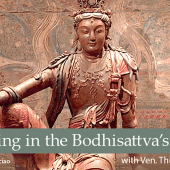May I be a protector for those who are without protectors,
a guide for travelers, and a boat, a bridge,
and a ship for those who wish to cross over.May I be a lamp for those who seek light,
a bed for those who seek rest,
and may I be a servant for all beings who desire a servant.
Engaging in the Bodhisattva’s Deeds, written by Shantideva in the 8th century, is credited by His Holiness the Dalai Lama as having the greatest influence of any teaching on his development of bodhicitta. At Sravasti Abbey, this text is read aloud every year on Christmas Day.
Teachings highlighted in bold are listed at the bottom of the page.
About the author
Shantideva lived in 8th-century ancient India, was born into a royal family and was set to assume the throne after his father. However, motivated to be of greatest benefit to all sentient beings, Shantideva left the royal life and entered monastic life at the renowned Nalanda Monastery.
About the text
Shantideva practiced and studied at Nalanda monastery secretly, such that his fellow monks thought he only did three things: eat, sleep and go to the bathroom. Frustrated with his seeming lack of dedication to the Dharma, Shantideva’s peers invited him to teach—his expected failure would be a sufficient reason to kick him out of the monastery.
Having arrived for the teaching, Shantideva asked the members of his audience: did they want to listen to something old or something new? Hearing that they wished to hear something new, Shantideva began to recite the poem he had composed, Engaging in the Bodhisattva’s Deeds. The depth of insight into both bodhicitta and emptiness contained within the text saw the monks track Shantideva down—he had disappeared after he had finished his teaching—to write down the text.
The text is composed in verse and divided into ten chapters:
• The first three chapters concern the benefits of bodhicitta, the altruistic intention to achieve the state of Buddhahood in order to benefit all sentient beings. The method to cultivate and sustain bodhicitta is explained here.
• Chapters Four and Five focus on how to implement bodhicitta in daily life, providing instruction on the perfection of ethical conduct within the Mahayana context. • Chapter Six concerns the perfection of fortitude—it is a well-known text due to its wealth of instruction on how to overcome the affliction of anger.
• Chapter Seven focuses on the perfection of enthusiastic effort.
• Chapter Eight is concerned with the perfection of meditation in the context of cultivating altruism and overcoming attachment to friends, possessions, reputation, and one’s own— and others’—bodies.
• Chapter Nine focuses on the perfection of wisdom, providing an exposition of the Prasangika view of emptiness.
• Chapter Ten concludes the text with a prayer dedicating the merit of the work to all sentient beings.
Who it's for
Engaging in the Bodhisattva’s Deeds is a text that lends itself to study by new and seasoned Dharma practitioners alike. It covers all the practices necessary to progress on the path to full awakening in an easy-to-read format with stark imagery and reasonings to inspire and transform the mind.
The three commentaries available provide the necessary guidance to penetrate the full depth of Shantideva’s meaning and frame the context within which the text was written. A text that the residents of Sravasti Abbey read annually on Christmas Day, this is a book—and set of commentaries—that provides a road map to awakening you’ll keep coming back to.
Resources
In 2009, Geshe Lhundup Sopa (1923–2014) gave a series of teachings on Chapter 6, which explains how to work with anger: Shantideva Teachings with Geshe Lhundup Sopa (2009)
In 2010, Khensur Wangdak Rinpoche provided commentaries on Chapters 1 and 2:
Teachings by Khensur Wangdak Rinpoche
Venerable Thubten Chodron has offered the following teachings on Shantideva’s text.
- Thursday morning teachings, which are streamed live from Sravasti Abbey: Engaging in the Bodhisattva’s Deeds (2020-present)
- Annual teachings on Shantideva’s text organized by Pureland Marketing in Singapore: Engaging in the Bodhisattva’s Deeds (Singapore 2006-Present)
- Teachings on Chapter 6 given in Mexico in April 2015: Working with Anger and Developing Fortitude (Mexico 2015)
If there is a remedy, then what is the use of frustration?
If there is no remedy, then what is the use of frustration?There is nothing whatsoever that remains difficult as one gets used to it.
Thus, through habituation with slight pain, even great pain becomes bearable.
Related Series

Engaging in the Bodhisattva's Deeds (2020–23)
Teachings on Shantideva’s Engaging in the Bodhisattva’s Deeds.
View Series
Engaging in the Bodhisattva's Deeds (Singapore 2006–present)
Annual teachings on Shantideva’s Engaging in the Bodhisattva’s Deeds organized by Pureland Marketing in Singapore.
View Series
Shantideva Teachings with Geshe Lhundup Sopa (2009)
Commentary on chapter 6 on cultivating fortitude and overcoming anger given by Geshe Lhundup Sopa at Sravasti Abbey in 2009.
View Series
Shantideva Teachings with Khensur Wangdak Rinpoche (2007-10)
Commentary on chapters 1 and 2 on the benefits of bodhicitta and confessing downfalls given by Khensur Wangdak Rinpoche at Sravasti Abbey...
View Series
Working with Anger and Developing Fortitude (Mexico 2015)
Teachings on chapter six of Shantideva’s Engaging in the Bodhisattva’s Deeds given at various venues in Mexico in April 2015. With consec...
View Series
Shantideva’s “Engaging in the Bodhisattva’s Deeds”
The practices that are necessary to progress on the path to awakening,